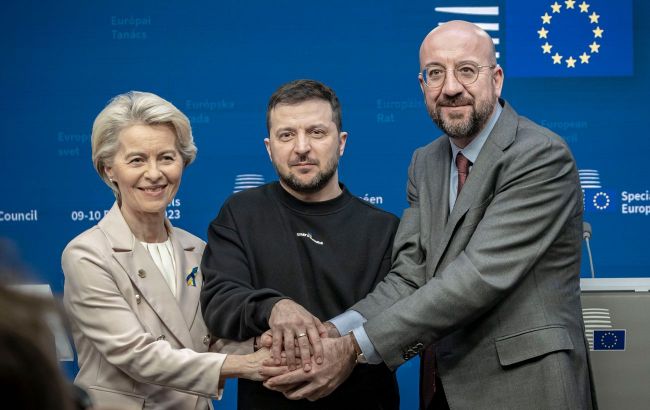EU and Ukraine agree on modernized DCFTA trade deal prioritizing market access and safeguards
 Volodymyr Zelenskyy, Ursula von der Leyen, Charles Michel (Getty Images)
Volodymyr Zelenskyy, Ursula von der Leyen, Charles Michel (Getty Images)
The European Commission has concluded negotiations with Ukraine on the revision of the EU-Ukraine Deep and Comprehensive Free Trade Area (DCFTA) agreement — the main trade deal between the EU and Ukraine, according to a press release from the European Commission.
The updated agreement is built around three key principles:
Market access based on regulatory alignment: Ukraine will gain broader access to the EU market in exchange for gradually adopting EU standards — particularly in areas such as animal welfare, pesticide use, and veterinary products. Kyiv is expected to report annually on its progress.
Import risk safeguards: Ukraine and the EU agreed on a safeguard mechanizm that allows either side to introduce restrictions if imports pose a threat to their domestic markets. For the EU, such assessments may be carried out at the level of the entire bloc or by individual member states.
Balancing trade interests: The updated agreement takes into account the sensitivities of certain EU agricultural sectors. For products such as sugar, poultry, eggs, grain, and honey, market access will remain limited. Meanwhile, broader access has been granted for less sensitive categories, aiming to increase trade volumes.
The parties also agreed to explore ways to support Ukrainian exports to traditional third-country markets and to assess progress in economic integration and Ukraine's EU accession prospects.
According to EU Commissioner for Trade and Economic Security Maroš Šefčovič, trade volumes between the EU and Ukraine reached approximately €67 billion in 2024, up from €26 billion in 2016.
"It includes a commitment of Ukraine to gradually align – by 2028 – to EU production standards in the agricultural sector, such as animal welfare or the use of pesticides," he said.
Specifically, for products such as eggs, sugar, and wheat, quotas will be increased but will remain below historical trade volumes to ensure stability in the EU market. For less "sensitive" products, quotas will increase moderately, while some categories will be fully liberalized.
At the same time, Ukraine will increase export quotas for pork, poultry meat, and sugar, and will reduce or eliminate tariffs on other goods. This will enhance export opportunities for European farmers, particularly in EU member states bordering Ukraine.
On March 20 of last year, the European Parliament provisionally extended trade liberalization measures with Ukraine through June 2025. This means Ukraine will continue to benefit from suspended quotas and tariffs.

